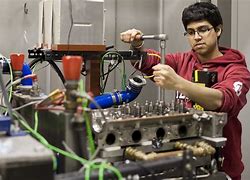Table of Contents
Introduction
Mechanical engineering is a fascinating field that involves the application of scientific and mathematical principles to design, analyze, and manufacture mechanical systems. In India, where technological advancement is rapidly growing, the demand for skilled mechanical engineers is on the rise. Whether you aspire to work in the automotive industry, aerospace, or manufacturing, becoming a mechanical engineer can open doors to a promising and rewarding career.
Educational Requirements
To embark on the journey of becoming a mechanical engineer, you need a strong educational foundation. The first step is completing your higher secondary education with a focus on science subjects such as Physics, Chemistry, and Mathematics.
After high school, you’ll need to clear entrance exams to secure admission to reputable engineering colleges. Some of the popular engineering entrance exams in India include JEE Main, JEE Advanced, and state-level engineering entrance exams.
Pursuing a Bachelor’s Degree in Mechanical Engineering
Once you clear the entrance exams, you can enroll in a Bachelor’s program in Mechanical Engineering. India boasts numerous prestigious engineering institutes like the Indian Institutes of Technology (IITs), National Institutes of Technology (NITs), and other renowned private and public colleges.
During your undergraduate studies, you’ll have the opportunity to choose specializations within mechanical engineering, such as thermal engineering, manufacturing, robotics, or automotive engineering.
Gaining Practical Experience
Acquiring practical experience is crucial for a successful career in mechanical engineering. Many colleges and universities offer internships and industrial training opportunities with reputed companies. Engaging in hands-on projects during your coursework can further enhance your practical skills.
Developing Technical Skills
As a mechanical engineer, you’ll need to be proficient in various technical tools and software. Computer-Aided Design (CAD) is a fundamental skill for designing and modeling mechanical components. Additionally, honing analytical and problem-solving skills is essential for tackling real-world engineering challenges.
Soft Skills for Success
In addition to technical expertise, soft skills play a vital role in a mechanical engineer’s success. Effective communication is essential when collaborating with teams and presenting ideas to clients. Moreover, teamwork and leadership abilities contribute to a harmonious work environment and project success.
Staying Updated with Industry Trends
Mechanical engineering is a dynamic field with constant advancements in technology. Attending seminars, workshops, and conferences can help you stay abreast of the latest trends and innovations. Joining professional organizations like the Institution of Mechanical Engineers (IMechE) can provide valuable networking opportunities and access to industry insights.
Job Opportunities for Mechanical Engineers
Mechanical engineers have a broad spectrum of career opportunities. They can work in the manufacturing sector, where they design and optimize production processes. The automotive industry also seeks skilled mechanical engineers to develop new vehicle technologies. Aerospace companies require mechanical engineers for designing aircraft and propulsion systems.
Career Growth and Advancement
For those seeking career growth, pursuing postgraduate studies can lead to specialized knowledge and research opportunities. Additionally, obtaining professional certifications can boost your credibility and expertise in specific areas of mechanical engineering.
Challenges and Opportunities in the Field
The field of mechanical engineering faces challenges due to rapid technological advancements. Embracing these changes and incorporating sustainability and green engineering practices offer significant opportunities for innovation and progress.
Conclusion
Becoming a mechanical engineer in India requires dedication, perseverance, and a passion for problem-solving. By obtaining a solid educational foundation, gaining practical experience, and developing technical and soft skills, you can carve a successful career path in this dynamic and evolving field.
FAQs
FAQ 1: How long does it take to become a mechanical engineer in India?
A- The duration depends on the chosen educational path. It typically takes four years to complete a Bachelor’s degree in mechanical engineering, followed by additional years for postgraduate studies if desired.
FAQ 2: Can I pursue a mechanical engineering degree online?
A- Yes, some institutions offer online courses in mechanical engineering. However, hands-on practical experience is vital, and some aspects of the curriculum may require on-campus learning.
FAQ 3: What are the average salary prospects for mechanical engineers in India?
A- The salary varies based on factors like experience, location, and the industry you work in. On average, entry-level mechanical engineers can expect a competitive salary, with significant growth opportunities.
FAQ 4: Is mechanical engineering a male-dominated field?
A- While traditionally male-dominated, the field of mechanical engineering is becoming more inclusive, and more women are pursuing careers in this industry.
FAQ 5: How can I specialize in robotics within mechanical engineering?
A- To specialize in robotics, you can choose relevant electives during your undergraduate or postgraduate studies. Participating in robotics-related projects and research can also provide practical experience in this area.




